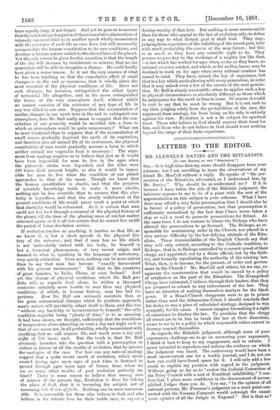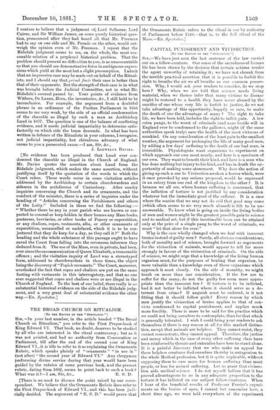LETTERS TO THE EDITOR.
MR. LLEWELYN DAVIES AND THE RITUALISTS.
[TO THE EDITOR OF THE " SPECTATOR."]
SIR,-It is high time that my name should disappear from your columns, but I am unwilling to leave the observations of my friend Mr. MacColl without a reply. He speaks of "the per- secution of the Ritualists, advocated, as I understand him, by Mr. Davies." Why should he so understand me P If it is because I have taken the side of the Ridsdale judgment, the inference appears to me to be of a piece with the rest of the argumentation on this subject in your columns. What I have done may afford a very faint presumption that I should also be in favour of a policy of persecution, but that presumption is sufficiently neutralised by the fact that I have never taken a step or said a word to promote prosecutions for Ritual. At the same time, I do not venture to blame the Bishops who have allowed the prosecutions to go forward. The Bishops, as re- sponsible for maintaining order in the Church, are placed in a very serious difficulty by the law-defying attitude of the Ritu- alists. These irreconcilables of the English Church say that they will only submit, according to the Catholic tradition, to Bishops ; that is, to Bishops controlled by a correct synod of their clergy, and appointed, not by a State official, but by the faith- ful, and formally repudiating the authority of the existing law. What, then, is to become, for the present, of order and govern- ment in the Church Mr. MacColl and others, let me say, ex- aggerate the consternation that would be caused by a policy of retaliation on the part of the Ritualists. The Evangelical Clergy have intimated, I believe, through their leaders, that they are prepared to submit to any enforcement of the law. They have no intention of making themselves martyrs for the black gown. If a Broad-Church clergyman were to go to prison rather than read the Athanasian Creed, I should conclude that his doing so was a piece of calculated strategy, designed to win sympathy for his cause. I cannot imagine his making it aright of conscience to disobey the law. To proclaim that the clergy all round are to be free to break the law at their discretion, seems to me to be a policy to which responsible rulers cannot in decency commit themselves.
As regards the Ridsdale judgment, although some of your expressions challenge me to go on answering your arguments, I think it best to keep to my engagement, and to refrain. I never intended to reproduce and enforce the evidence on which the judgment was based. The controversy would have been a most inconvenient one for a weekly journal, and I do not see how you could have found space for it. I will only add a few words to explain my position with regard to the judgment. Without going so_ far as to "endow the Judicial Committee of the Privy Council with a sort of Pontifical infallibility," I con- fess that I place more confidence in the discernment of accom- plished Judges than you do. You say, "In the opinion of all rational persons, Mr. Freeman's judgment on a moot point con- nected with the Norman Conquest would outweigh the unani- mous opinion of all the Judges in Engiand." But is that so ?
venture to believe that a judgment of Lord Selborne, Lord Cairns, and Sir William James, on some purely historical ques- tion, pronounced after they had heard all that Mr. Freeman had to say on one side and Mr. Fronde on the ether, would out- weigh the opinion even of Mr. Freeman. I repeat that the Ridsdale judgment seems to me, on the whole, the most rea- sonable solution of a perplexed historical problem. That the problem should present no difficulties to you, is as unaccountable as that you should see demonstrative force in ambiguous expres- sions which yield at the most but a slight presumption. I admit that an impressive case maybe made out on behalf of the Ritual- ists, and I should say that prima facie their case is better than that of their opponents. But the strength of their case is in what was brought before the Judicial Committee, not in what Mr. Ridsdale's counsel passed by. Your points of evidence from Withers, De Laune, Horn, the inventories, &c., I still hold to be inconclusive. For example, the argument from a doubtful phrase in an ordinance of the Puritan Parliament in 1644 seems to me very weak, by the side of an official condemnation of the chasuble as illegal by such a man as Archbishop Laud in 1637. The question is one of the balance of conflicting
• evidence, and it needs judicial impartiality to determine satis- factorily on which side the beam descends. In what has been written in defence of the Ritualists in your columns, I recognise, not judicial impartiality, but chivalrous advocacy of what seems to you a persecuted cause.—I am, Sir, &c.,
J. LLEWELYN DAVIES.
[No evidence has been produced that Laud ever con- demned the chasuble as illegal in the Church of England. Mr. Davies quotes the assertion about Laud from the Ridsdale judgment, which makes the same assertion, without justifying itself by the quotation of the words to which the Court refers. Those words occur in some visitation articles addressed by the Archbishop to certain churchwardens and sidemen in the archdiocese of Canterbury. After sundry inquiries concerning the Church and its ornaments, and the conduct of the minister, there is a series of inquiries under the heading of " Articles concerning the Parishioners and others of the Laity." Included in these we find the following :- " Whether there be any in your parish who are known or sus- pected to conceal or keep hidden in their houses any Mass books, Epostesses, breviaries, or other books of Popery or superstition, or any chalices, copes, vestments, albs, or other ornaments of superstition, uncancelled or undefaced, which it is to be con- jectured that they do keep for a day, as they call it ?" Both the heading and the whole substance of this passage ought to have saved the Court from falling into the erroneous inference they deduced from it. The use of the Mass, even in private, had been, .ever since the excommunication of Queen Elizabeth, a treasonable ,offence ; and the visitation inquiry of Laud was a stereotyped form, addressed to churchwardens in those times, the object being the discovery of "Popish recusants." The Court, moreover, overlooked the fact that copes and chalices are put on the same footing with vestments in this interrogatory, and that no one ever suggested that copes and chalices were or are illegal in the Church of England. To the best of our belief, there really is no substantial historical evidence on the side of the Ridsdale judg- ment, and a very great deal of substantial evidence the other way.—En. Spectator.]







































 Previous page
Previous page